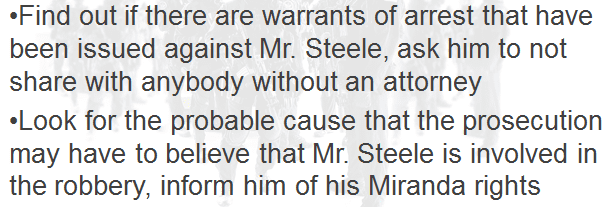American Criminal Justice System
Analysis and Application: Explain the Steps a Criminal Defendant May Go Through in the American Criminal Justice System
The following case study presents issues related to the steps a criminal defendant may go through in the American criminal justice system from arrest through sentencing.
Case Study:
You have just been hired as a lawyer at a small criminal defense firm. On your first day, Louis Steele enters the office and asks to speak to an attorney. All of the other lawyers are at lunch so you speak to Mr. Steele. Mr. Steele states that he is worried about being arrested for an armed robbery of a gas station that occurred the night before. Mr. Steele explains the following to you after you assure him that anything he tells you will be protected under the attorney-client privilege.
Mr. Steele states that he has been out of work and owes money for gambling debts; that he was desperate for money and robbed a gas station last night located a couple of blocks from his house. Mr. Steele states that he used a BB gun but admits that it looks like a real gun. Mr. Steele took a total of $130.00 during the robbery. Mr. Steele states that he was not wearing a mask and that the attendant got a good look at his face. This morning, Mr. Steele heard that officers had stopped by his apartment looking for him. Mr. Steele tells you that the only person at the apartment this morning was his 13-year-old nephew. Mr. Steele did not know whether the 13-year-old let the police in or if the police forced themselves in, but states that the police found the BB gun he used under Mr. Steele’s bed. Mr. Steele wants to know what is going to happen to him should he be arrested — from arrest to sentencing. Mr. Steele has no experience with the criminal justice system and has never been arrested before.
Please prepare a PowerPoint presentation as follows:
- Include a minimum of 10 slides (excluding cover and reference slide).
- As Mr. Steele’s lawyer, explain the advice you will give him both pre-arrest and post-arrest.
- Identify all major steps you will take to prepare a defense for Mr. Steele , including investigation of evidence and witnesses, should Mr. Steele be arrested for a felony such as armed robbery.
- Explain to Mr. Steele the pre-trial process and any motions you would file on his behalf (including your reasoning for filing these motions).
- Describe to Mr. Steele his trial options.
- If this case goes to trial, discuss with Mr. Steele the possible sentence he could face based upon a review of your own state’s criminal laws.
- Define key legal terms to Mr. Steele so he has an understanding of the legal principles involved.
- Cite all legal authority used in giving advice to Mr. Steele.
Bonus question (1-2) paragraphs
Topic: Jury Deliberations
The state in which you live currently has legislation requiring that all juries consist of 12 individuals and that the verdict be unanimous. In response to recent high-profile case that resulted in a verdict of not guilty, two proposals have been introduced into the legislature to amend how juries will operate. The first is a proposal to eliminate the need for a unanimous verdict so that a majority of 9 of the 12 jurors is all that is needed for a verdict of guilty, or not guilty, in criminal cases. A second proposal has been introduced that would change the number of jurors from 12 to 6 in all criminal cases but would keep the requirement that the verdict be unanimous.
Discuss your reaction to these proposed amendments. What are the pros and cons of each proposal and would these proposals be constitutional?
Solution Preview for American Criminal Justice System
10 Slides
